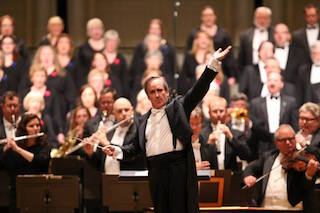
Russian Night Provides Sirring End to 2015 May Festival
Brush up your Russian would have been good advice for anyone
attending Saturday night’s (May 30) final performance of the 2015 Cincinnati May
Festival at Music Hall.

Led by May Festival music director James Conlon, the program drew on three powerful works by Russian composers, all with references to Russian history.
There was the Symphony No. 13, “Babi Yar,” by Shostakovich, also excerpts from the opera “Khovanshchina” by Mussorgsky and the “1812” Overture by Tchaikovsky. Conlon, who led the Cincinnati Symphony Orchestra and the May Festival Chorus, directed by Robert Porco, provided helpful introductory comments to each work, noting their historical context and the circumstances of their composition.
Shostakovich’s 13th Symphony is a choral symphony for solo bass, men’s voices and orchestra, each of its five movements based on a poem by Yevgeny Yevtushenko. It takes its name from the first poem, “Babi Yar,” recalling the mass murder of 70,000 Jews by the Nazis at Babi Yar, near Kiev, in 1941. Soloist for this performance was the superb Georgian bass-baritone Mikhail Kolelishvili, who delivered Shostakovich’s bitter denunciation of both Nazi and Soviet anti-Semitism with commanding presence.
The second movement, “Humor,” extolling the power of humor, was taken at a rowdy clip, succeeded by “In the Store,” a tribute to Russian women, where the slow tread of the music reached a stirring climax. “Fears” began with a lyrical tuba solo (performed by Christopher Olka of the Seattle Symphony). The men’s voices grew march-like on “We weren’t afraid of construction work in blizzards or of going into battle under shellfire.”
The final poem, “Career,” celebrates those who, like Galileo, were unafraid to take risks in defense of their beliefs. Instrumental color complemented Kolelishvili’s imposing voice here, with episodes for pizzicato strings and brass, raucous bassoon and a string passage capped by celeste and chimes, to bring the Symphony to a lovely, upbeat end.
Kolelishvili displayed a thrilling voice in excerpts from the ends of acts I, III and V of “Khovanshchina,” Mussorgsky’s opera about religious and political strife during the reign of Peter the Great. (Left unfinished at his death in 1881, the opera was completed by Rimsky-Korsakov and revised by Shostakovich. It was heard in the version by Shostakovich.)
Kolelishvili was mesmerizing as Ivan Khovansky and Dosifey, respective leaders of the Streltsy (a military faction) and the Old Believers, both opponents of the czar. The full Chorus performed their role with great distinction, as did the CSO, which, with an extra brass choir placed in the balcony, made a magnificent sound.
Final work on the program was Tchaikovsky’s “1812” Overture, which as Conlon explained, has nothing to do with July 4, having been commissioned in celebration of the defeat of Napoleon’s forces when they invaded Russia in 1812. The Chorus offered a stirring prayer at the beginning, and the work built to a stunning conclusion with pealing bells and digital cannon shots.
As per tradition, the concert (and the Festival) ended with a lusty audience sing along of the “Hallelujah” Chorus from Handel’s “Messiah.”